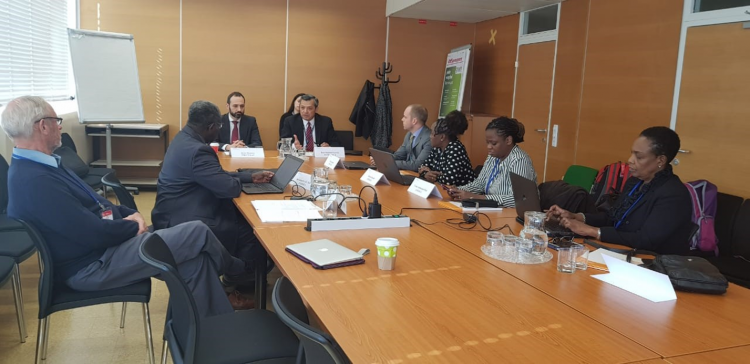Jamaica’s Nuclear Safety and Radiation Protection Act (NSRPA) was passed by Parliament in July 2015 and came into effect in August 2015. Under the new Act, the Hazardous Substances Regulatory Authority was established in September 2017, becoming the first national nuclear regulatory body in the English-speaking Caribbean. As an independent agency, the HSRA works to effectively regulate practices and facilities using ionizing radiation and nuclear technology, with the objective of protecting the Jamaican people, their property and the environment.
Since its establishment, the HSRA has committed itself to enhancing Jamaica’s infrastructure for radiation, transport and waste safety, engaging closely with the Agency’s technical cooperation (TC) programme. Jamaica began working on strengthening its regulatory infrastructure for safety before the formal establishment of the Authority. The country participated in multiple, safety-related activities in cooperation with the IAEA, through national and regional projects, which included expert missions to verify Jamaica’s national radiation source inventory and to install a Regulatory Authority Information System (RAIS). In 2016, several Jamaican experts participated in a session of the Agency’s School for Drafting Regulations on Radiation Safety, equipping them with the skills and support necessary to draft new regulations and ensuring Jamaica’s alignment with the IAEA Safety Standards. Building upon this achievement, the HSRA designated national counterparts for each of the seven Thematic Safety Areas (TSAs), who subsequently worked closely with an IAEA expert, from 4 to 8 February 2019, to address regulatory gaps identified by the IAEA’s Radiation Safety Information Management System (RASIMS).
As part of the ongoing national project, an additional expert mission was organized in cooperation with the Canadian Nuclear Safety Commission (CNSC). Launched on 11 March and continuing until 5 April, the expert mission will support the development of the HSRA’s notification, authorization, inspection, enforcement and operational systems, which will form the core of the Authority’s regulatory infrastructure. These systems will enable the HSRA to receive applications for the use of radiation sources, review those applications, schedule regular inspections and develop a national registry of institutions and facilities which possess and deploy sources. This underlying structure of systems and approvals will help the HSRA to exercise regulatory control over all sources within its borders, ensuring that patients, professionals and the public are protected from unnecessary exposures.
As Jamaica has accelerated its engagement with nuclear science, particularly in the field of human health, the HSRA has played a pivotal role in ensuring the effective implementation of national projects and the safe application of nuclear technologies.
In reaction to the growing burden placed on national health authorities by non-communicable diseases, the HSRA is contributing to the re-establishment of nuclear medicine services at the University Hospital of the West Indies (UHWI). After the nuclear medicine facility was closed in 2002, a technical cooperation project was launched to develop the necessary physical and human resources for the facility’s continued operation. Today, the HSRA is supporting the calibration and quality-assurance of the refurbished facility, however, before a source can be imported to conduct the calibration, the Hazardous Substances Regulatory Authority must provide its formal authorization. Following the conclusion of the ongoing expert mission—which is finalizing Jamaica’s regulatory authorization systems—the HSRA will be able to conduct a comprehensive assessment of UHWI’s nuclear medicine facility and permit its application of sources in the diagnosis of disease.







